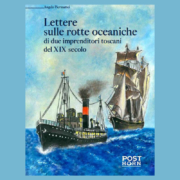Lettere sulle rotte oceaniche di due imprenditori toscani del XIX secolo
Angelo Piermattei – Lettere sulle rotte oceaniche di due imprenditori toscani del XIX secolo (Letters on the oceans routes of two 19th century Tuscan entrepreneurs), Post Horn, Milan, September 2023, in Italian, 17×24 cm, 168 pages with several colour illustrations. ISBN 978-88-945287-5-6. €40 + postage, board@posthornmagazine.com
Vito Viti, native of Volterra (1787-1866), was an alabaster merchant who moved to the United States and lived in Philadelphia, from where he maintained correspondence with his family and with his nephew Giuseppe Viti, who also exported alabaster to American customers. In 1931, Emilio Diena wrote the first article in the Corriere Filatelico on “The discovery of ancient Italian stamps in Vito Viti’s correspondence”. Piermattei’s volume uses insights and research on about 300 letters from the two Tuscan entrepreneurs who used the postal service as a more modern means of communication at that time to reach places divided by oceans or by great distances of the earth’s surface. The author points out that sending letters to correspondents overseas was a luxury accessible only to an elite: “From a postal historical point of view, those letters with or without stamps, with stamps and handwritten lettering, allow us to deepen the complex methods adopted by the postal service responsible for transmitting written communication by land and sea in the nineteenth century. “The amount of correspondence received by the Vitis from Italy includes letters (often illustrated) franked with stamps that testify to the succession of occupations of various pre-unification states and the subsequent constitution of Provisional Governments that led to referenda for the annexation to the Kingdom of Sardinia and then to the proclamation of the Kingdom of Italy on 17 March 1861. On the Viti Archive of Philadelphia, the author points out that these letters testify to the transition from the postal service with the help of the English forwarder to the first letters with the taxation entirely prepaid by the sender. The second part of the volume is dedicated to the travels (1824-1849) of the globetrotter Giuseppe Viti.



